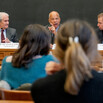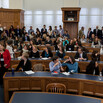Clinic Reacts to SCOTUS Decision in Case of Death-Row Inmate
A death-row inmate will have a second chance at his appeal after the U.S. Supreme Court vacated a prior ruling and remanded his case back down to the the Pennsylvania Supreme Court for further proceedings. The development comes after students from the Ethics Bureau at Yale submitted an amicus brief last December arguing that there were “egregious constitutional and ethical violations” in the case.
Williams v. Pennsylvania specifically examined whether Pennsylvania Supreme Court Chief Justice Ronald D. Castille should have recused himself from an appeal to the Pennsylvania Supreme Court by death-row inmate Terrance Williams. Castille served as the District Attorney of Philadelphia and personally authorized his subordinates to seek the death penalty for Williams while serving in that role.
The Supreme Court held that the Chief Justice Castille's denial of the recusal motion and his subsequent judicial participation in Mr. Williams' case violated the due process clause.
“It is truly rewarding to see the Court's reversal after working on an amicus brief in this case and traveling to see the oral argument,” said Grace Hart ’16, a recent Yale Law graduate who worked as a member of the Ethics Bureau. “Mr. Williams' death sentence should not be allowed to stand in the face of such egregious violations of judicial ethics, and we are thrilled that he will receive a new hearing before a truly neutral court.”
In making the decision, the High Court used many of the major arguments that were included in clinic’s amicus brief, finding that Castille’s prior involvement in the case as District Attorney created an impermissible appearance of partiality and a substantial risk of actual bias. Seven other amicus briefs were submitted in the case on behalf of the petitioner.
“As the Bureau argued in its brief, this partiality stemmed from Chief Justice Castille's decision to seek the death penalty against Mr. Williams and his role in supervising the trial prosecutor,” explained Joseph Samuels ’17, a current Yale Law student who also worked on the case. “This partiality was further compounded because his subsequent task as a judge was to evaluate the performance of his own law office and the lawyers he supervised in prosecuting Mr. Williams.”
The Court's opinion is also significant in its harmful error analysis, which reflects the clinic’s argument that a multi-member panel cannot "cure" judicial impropriety. The Court held that Chief Justice Castille's failure to recuse himself and his participation in Mr. Williams' case was a due process violation despite the fact that he did not cast the deciding vote. Instead, the Court's opinion emphasizes that an appellate court's decision-making process is necessarily collaborative, so it does not matter whether the biased judge's vote was necessary to the outcome — the decision of a court with a biased judge cannot provide the appearance of impartiality as required by the Constitution, according to the decision.
John Rafael Perez ’16, who also recently graduated after working on this case, said the clinic was encouraged by the language in the court’s opinion.
“While the holding in this case is narrow, the Court's reasoning and underlying logic is broad — a judge should not decide a case in which he has a significant personal interest and the fact that he was only one judge on a multi-member panel cannot cure this impropriety,” said Perez. “We are hopeful that this opinion will lead to further jurisprudence supporting the importance of judicial ethics.”
Members of the Ethics Bureau said they believe the Court’s reasoning regarding judicial conflicts of interests could inform other cases involving related issues of legal ethics and professional responsibility.
The Ethics Bureau advises lawyers on how to proceed when faced with professional responsibility questions under the applicable rules of professional conduct and other ethical dilemmas. Students draft amicus briefs in cases involving professional responsibility issues; help prisoner’s counsel develop claims of ineffective assistance of counsel; and offer ethics advice to nonprofit organizations. EBaY is taught by Lawrence Fox, the George W. Crawford Visiting Lecturer in Law.


